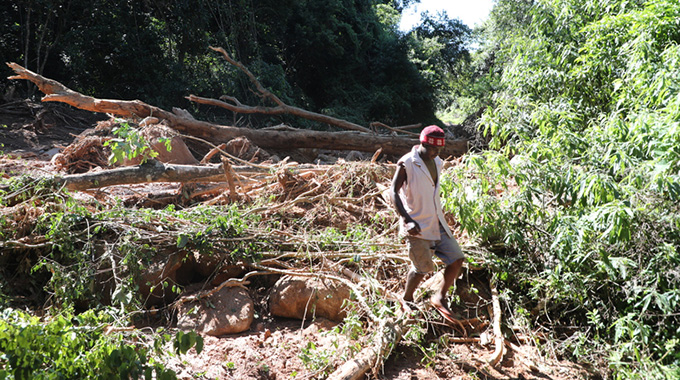
The ManicaPost

Ray Bande Senior Reporter
FOR every action, there is a reaction. While this could be a known fact in scientist Isaac Newton’s third law of motion — events unfolding in the once picturesque Vumba area are also a living testimony of this reality.
Not so long ago, we used to have a cool easterly breeze filtering through the vast tracts of flora and fauna in the once densely vegetated Vumba mountains bordering Mozambique but today, we have an energy-sapping, warm and nauseating waft.

Not so long ago, we used to have small tributaries flowing peacefully from different directions, we now have clogged water sources, sand-filled watercourses, all choked by unrestrained siltation because of illegal upstream cultivation.
Indeed, not so long ago, we used to have a serene ambience of green shrubs and all sorts of foliage, we now have a sickening sight of pole and dagga huts perched on the slopes of an undulating terrain.
And it will not be surprising that one day the beautiful silvery cheeked hornbills and Samango species of birds will not be there in Vumba.
Last weekend, the Vumba area leading to world-class prime tourist destination Leopard Rock Hotel in particular, was hit by landslides that saw movement of rock and debris down the slopes onto the tarmac leaving roads blocked, posing a threat to human and animal life.
Leopard Rock proprietor Mr Samir Shasha explained: “We experienced some landslides and the road was blocked. We managed to clear the road and everything was done by workers employed by Leopard Rock. There is constant deforestation in the Vumba.”
Landslides are the movement of rock and debris down a slope.
The majority of landslides are caused by multiple conditions acting in unison to destabilise a slope.
Wildfires, heavy rainfall, earthquakes, environmental degradation, and volcanic eruptions are known to trigger landslides.
Bottom line is landslides are mainly caused by gravity acting on weakened rocks and soil that make up a sloping area of land.
Both natural and human-related activities can increase the risk for landslides. Water from heavy rainfall is a frequent trigger for landslides.
Plants help keep the soil stable by holding it together like glue with their roots. When this glue is removed, the soil loosens, and gravity acts upon it much more easily. The loss of vegetation after a fire makes the razed land susceptible to slides.
Hence Mr Shasha queried: “If you harvest the rocks, what will be left?”
There has been a lot of rock harvesting in the Vumba area for the purposes of road and house construction.
This has led to untold land degradation and together with deforestation, land cover has been removed leaving the surrounding areas at risk of landslides and other environmental vices.
Manicaland provincial road engineer Mr Atherton Zindoga confirmed that even the contractor that was given the task to repair the roads in the Vumba area in the aftermath of Cyclone Idai — Rodcroft — was also harvesting rocks by the roadside.
“It happened but we stopped it,” said Mr Zindoga
Environmental Management Agency provincial manager Mr Kingston Chitotombe concedes that the situation in Vumba needs attention.
“I think these (landslides) are some of the effects of land degradation in the area. We all know that there are some migratory farmers coming from dry lands of Marange and other areas, opening up some pieces of land for farming in Vumba.
“For the record, areas such as Vumba — we call them ecological fragile zones. Once you start some farming activities in such areas you are bound to interfere with the ecosystem resilience in the area. We have never had such (landslides) in the past in those areas and we know this is all because of the massive land degradation happening in those areas,” said Mr Chitotombe.
He warned those contributing towards land degradation in the area saying: “People must be made aware that we owe it to future generations to ensure that the environment is kept intact and safe. Surely, history will judge us harshly with the manner we are cutting trees and harvesting rocks. As EMA we will not sit down and watch. We will invoke the provision of the law in instilling and maintaining law and order in communities.”
Friends of Vumba chairperson Sue Ingram said: “Environmental degradation in the Vumba is a big issue with illegal harvesting of trees and clearing of forests for field crops but most of all this happens in river lines.
“This is where landslides are most common I would think but I have not done any research on that. A good example is down the Essex Road, where someone has cleared indigenous forests along the river line to plant crops.”



